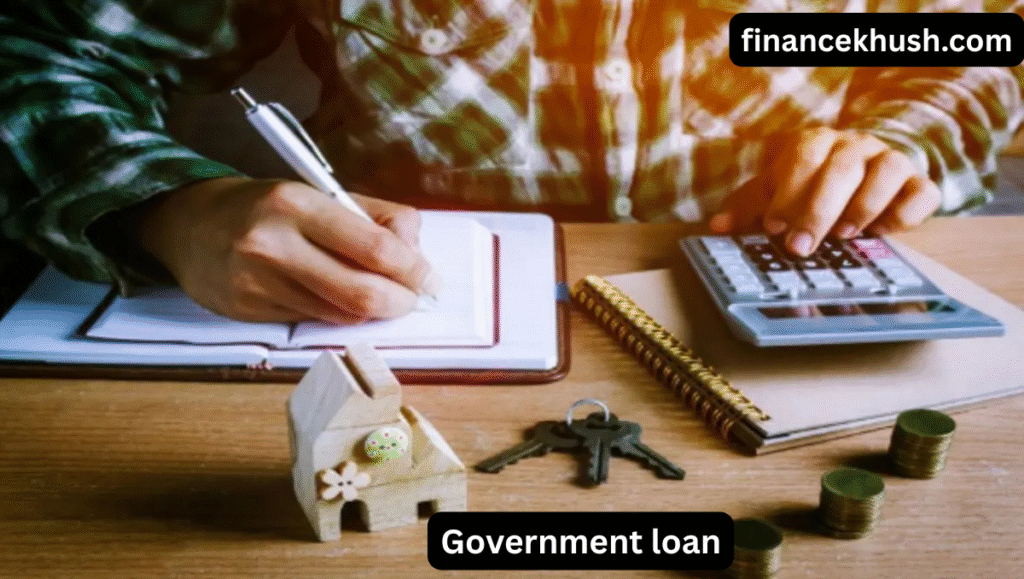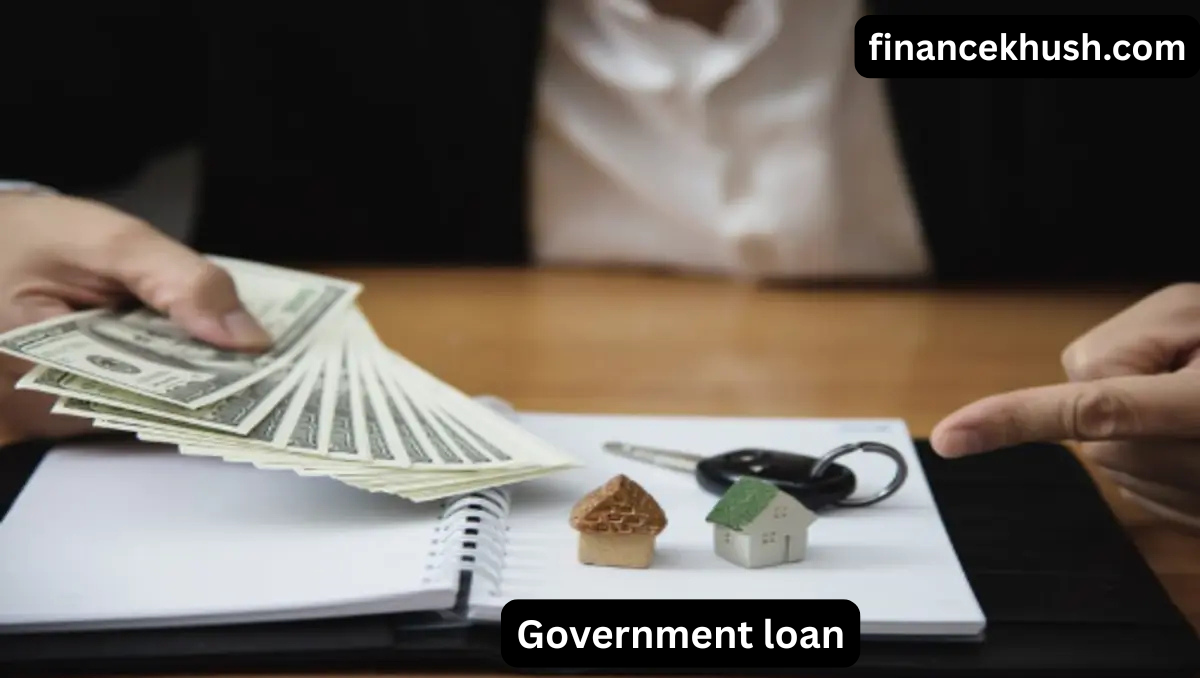Government Loan is a type of financial assistance provided by the government to help individuals, students, and businesses. These loans come with lower interest rates, flexible repayment options, and are easier to qualify for than private loans. Whether you’re looking to fund your education, buy a home, or start a business, a government loan could be the perfect solution
With various types of loans available, such as student loans, home loans, and business loans, the government provides support for many different needs. The application process is straightforward, and the benefits include affordable terms and the possibility of loan forgiveness in some cases. A government loan can help you achieve your goals without the burden of high-interest rates or tough qualifications.
What Are Government Loans?
A government loan is a type of loan that is funded by the government or through government-approved programs. These loans are available to individuals, businesses, and students to help with a variety of needs such as buying a home, starting a business, or paying for education.
The primary difference between government loans and loans from private banks or lenders is that government loans often come with lower interest rates, better repayment terms, and, in some cases, even forgiveness options. Additionally, since these loans are backed by the government, they are typically easier to qualify for.
Types of Government Loans
There are several types of government loans, each designed for different needs. Let’s take a closer look at some of the most common types.
1. Government Loans for Students
Education is one of the most common uses for government loans. If you’re planning to attend college or university but can’t afford the tuition, a government student loan may be the perfect solution.
The Federal Student Loan Program in the United States is the most well-known option. These loans typically have lower interest rates than private loans, and some offer income-based repayment options. There are two main types of student loans:
- Direct Subsidized Loans: These loans are based on financial need and the government pays the interest while you’re in school or during deferment periods.
- Direct Unsubsidized Loans: These loans are available to all students, regardless of financial need. However, interest will accumulate while you are in school, and it will be added to the principal balance.
2. Home Loans
Buying a home is one of the most significant investments most people will make in their lives. Government loans can help ease the financial burden of purchasing a home. These loans are offered by the government through programs like:

- FHA Loans (Federal Housing Administration): FHA loans are designed for low- to moderate-income homebuyers and are easier to qualify for than conventional loans. They also require a lower down payment, sometimes as little as 3.5%.
- VA Loans (Veterans Affairs): These loans are available to veterans and active-duty military personnel. They offer zero down payment and competitive interest rates.
- USDA Loans: These loans are designed for rural and suburban homebuyers and are backed by the U.S. Department of Agriculture. They offer low-interest rates and no down payment.
3. Business Loans
Small businesses are the backbone of the economy, and government loans help entrepreneurs get their ventures off the ground. Some common government business loan programs include:
1: SBA Loans (Small Business Administration): The SBA offers various loan programs that are ideal for small businesses. These loans come with lower interest rates and longer repayment terms. Popular SBA loans include the SBA 7(a) loan, which can be used for general business expenses, and the SBA Microloan, which is designed for small loans under $50,000.
2: CDC/504 Loans: These loans are intended for purchasing fixed assets such as land, buildings, or equipment. They provide long-term, low-interest financing.
4. Personal Loans
In some cases, government loans can be used for personal expenses such as paying off debt, medical bills, or home improvements. While government-funded personal loans are less common than other types, there are still options available. For example, some local or state governments offer loans for home repairs or disaster recovery.
How Do Government Loans Work?
Government loans work in much the same way as loans from private lenders, but there are some key differences. With most government loans, the government acts as the lender or guarantees the loan, reducing the risk for the lender.
The government typically offers loans with lower interest rates and more flexible repayment terms than private lenders. Some government loans also offer deferment or forbearance options, allowing borrowers to pause or lower their payments in times of financial hardship.
For example, if you take out a government loan to pay for college, you may be able to defer payments until after you graduate. Similarly, with certain government-backed business loans, you may be eligible for a grace period before you begin repaying.
Benefits of Government Loans
Government loans offer several advantages over loans from private institutions. Here are some of the key benefits:
- Lower Interest Rates: Since government loans are often subsidized or guaranteed by the government, they typically come with lower interest rates than private loans.
- Flexible Repayment Terms: Many government loans offer flexible repayment options, including income-driven repayment plans or extended repayment periods.
- Easier Qualification: Government loans often have less strict qualification criteria, making them more accessible to individuals with less-than-perfect credit.
- Loan Forgiveness: Some government loans, especially student loans, offer the possibility of loan forgiveness if you work in certain public service fields for a set number of years.
- No Prepayment Penalties: Unlike some private loans, government loans generally do not charge prepayment penalties, meaning you can pay off your loan early without additional fees.

How to Apply for a Government Loan
The application process for government loans can vary depending on the type of loan you’re seeking. Below are some general steps to apply for a government loan:
1. Determine Eligibility
Each government loan program has specific eligibility criteria. For example, student loans are based on financial need, while business loans may require a solid business plan and proof of revenue. Make sure you meet the eligibility requirements before applying.
2. Gather Necessary Documents
The application process for government loans often requires a lot of documentation. Be prepared to provide personal identification, proof of income, tax returns, and any other relevant financial information. If you’re applying for a business loan, you may need to provide a business plan, financial statements, and other documents.
3. Fill Out the Application
Government loan applications are often available online, but you may also be able to apply in person or by mail. Be sure to fill out the application completely and accurately. Missing or incorrect information can delay the process.
4. Submit the Application
Once you’ve filled out the application and gathered all the necessary documentation, submit your application to the appropriate government agency or lender. After submission, the government will review your application and determine if you qualify for the loan.
5. Wait for Approval
The approval process can take anywhere from a few weeks to a few months, depending on the type of loan and the volume of applications. Be patient during this time, and make sure you provide any additional information or documentation if requested.
6. Repay the Loan
Once your loan is approved and disbursed, make sure to stay on top of your repayment schedule. Government loans typically offer favorable repayment terms, so take advantage of this opportunity to pay off the loan over time.
Tips for Getting Approved for a Government Loan
Getting approved for a government loan can be easier than you think, as long as you follow a few important steps:
- Know your credit score: While government loans tend to have more flexible credit requirements, it’s still important to know your credit score and work to improve it before applying.
- Review eligibility criteria: Make sure you meet all the requirements before applying, whether it’s for a student loan, business loan, or home loan.
- Prepare your documents: Have all the required documentation ready to go. This will speed up the approval process and demonstrate that you’re serious about your loan application.
- Follow instructions: Make sure you read and follow the instructions carefully on the application forms to avoid delays or rejection.

Conclusion
Government loans are a powerful tool for individuals, students, and businesses in need of financial assistance. They offer lower interest rates, flexible repayment terms, and in some cases, loan forgiveness. Whether you’re looking to pay for school, buy a home, or start a business, there’s likely a government loan program that can help.
Read more
Make sure you understand the different types of government loans available and follow the proper steps to apply. By doing so, you can secure the financial support you need to reach your goals without the burden of high-interest rates or unfavorable terms.
Faq’s
1. What is a Government Loan?
A government loan is a type of financial assistance offered by the government to help individuals, students, and businesses. These loans typically come with lower interest rates, flexible repayment terms, and can be used for various purposes like education, buying a home, or starting a business.
2. Who is Eligible for a Government Loan?
Eligibility for a government loan depends on the type of loan you’re applying for. For example, student loans require proof of financial need, while business loans may need a solid business plan. Generally, government loans are easier to qualify for than private loans, even for those with less-than-perfect credit.
3. How Do I Apply for a Government Loan?
To apply for a government loan, you’ll need to fill out an application form, provide necessary documents (like proof of income, tax returns, etc.), and submit it to the relevant government agency. Each loan type has its specific requirements, so make sure to check them before applying.
4. What Are the Benefits of Government Loans?
Government loans offer several advantages, such as lower interest rates, longer repayment periods, and easier qualification criteria compared to private loans. Some government loans, like student loans, also offer the possibility of loan forgiveness after a set number of years of public service.
5. What Types of Government Loans Are Available?
There are various types of government loans, including:
- Student Loans: To help pay for education.
- Home Loans: For buying a home, such as FHA or VA loans.
- Business Loans: For small businesses or startups.
Each loan type has different eligibility requirements and repayment terms.
6. How Do I Repay a Government Loan?
Repaying a government loan involves following a set schedule provided by the lender. Depending on the loan type, you may have options like income-driven repayment plans, deferment, or forbearance. Make sure to stay updated on your payment dates to avoid any penalties.
